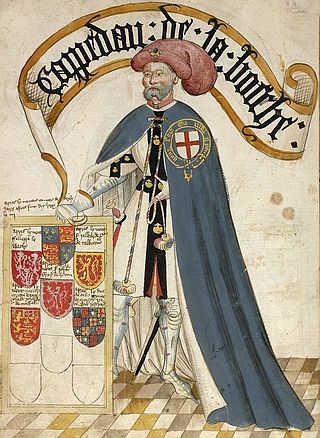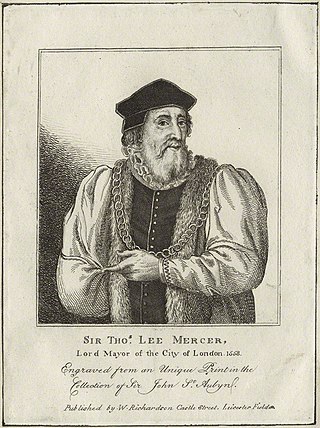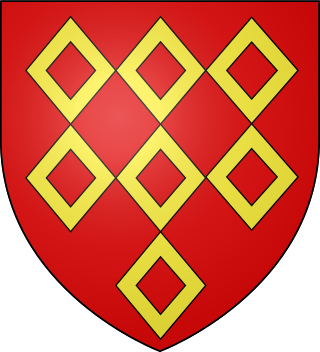Sir Henry Picard was Lord Mayor of London in 1356 and 1357. [1]
He was made Sheriff of the City of London in 1348 and elected Lord Mayor in 1356.
In 1363 he organised the meeting of the king of England Edward III with the kings of Scotland, France, Denmark and Cyprus. [2]

The Lord Mayor of London is the mayor of the City of London, England, and the leader of the City of London Corporation. Within the City, the Lord Mayor is accorded precedence over all individuals except the sovereign and retains various traditional powers, rights, and privileges, including the title and style The Right Honourable Lord Mayor of London.

Simon Sudbury was Bishop of London from 1361 to 1375, Archbishop of Canterbury from 1375 until his death, and in the last year of his life Lord Chancellor of England. He met a violent death during the Peasants' Revolt in 1381.

Earl of Rothes is a title in the Peerage of Scotland. It was created in 1458 for George Leslie, 1st Lord Leslie. He had already been created Lord Leslie in 1445, also in the Peerage of Scotland. His grandson, the third Earl, having only succeeded his elder brother in March 1513, was killed at the Battle of Flodden on 9 September of the same year. His son, the fourth Earl, served as an Extraordinary Lord of Session. Lord Rothes was also tried for the murder of Cardinal Beaton but was acquitted.
Lord mayor is a title of a mayor of what is usually a major city in a Commonwealth realm, with special recognition bestowed by the sovereign. However, the title or an equivalent is present in other countries, including forms such as "high mayor". Aldermen usually elect the lord mayor from their ranks.

Charles Thomson Ritchie, 1st Baron Ritchie of Dundee, was a British businessman and Conservative politician who sat in the House of Commons from 1874 until 1905 when he was raised to the peerage. He served as Home Secretary from 1900 to 1902 and as Chancellor of the Exchequer from 1902 to 1903.

The House of Balliol was a noble family originating from the village of Bailleul in Picardy. They held estates in England, granted during the reign of King William Rufus. Through marriage, they had claims to the Throne of Scotland. One member of the family, John Balliol, was named King of Scotland after the disputed succession following extinction of the Dunkeld line. John was deposed, leading to the First War of Scottish Independence. His son, Edward Balliol, also briefly controlled the Scottish throne during the Second War of Scottish Independence. Edward had no issue, and the direct line went extinct with him.
The Lord Warden of the Marches was an office in the governments of Scotland and England. The holders were responsible for the security of the border between the two nations, and often took part in military action. They were also responsible, along with 'Conservators of the truce', for administering the special type of border law known as March law.

Jean III de Grailly, Captal de Buch,, was a Gascon nobleman and a military leader in the Hundred Years' War, who was praised by the chronicler Jean Froissart as an ideal of chivalry.

Archibald Douglas, Earl of Douglas and Wigtown, Lord of Galloway, Douglas and Bothwell, called Archibald the Grim or Black Archibald, was a late medieval Scottish nobleman. Archibald was the bastard son of Sir James "the Black" Douglas, Robert I's trusted lieutenant, and an unknown mother. A first cousin of William 1st Earl of Douglas, he inherited the earldom of Douglas and its entailed estates as the third earl following the death without legitimate issue of James 2nd Earl of Douglas at the Battle of Otterburn.

Nine Worthies of London is a book by Richard Johnson, the English romance writer, written in 1592. Borrowing the theme from the Nine Worthies of Antiquity, the book, subtitled Explaining the Honourable Excise of Armes, the Vertues of the Valiant, and the Memorable Attempts of Magnanimous Minds; Pleasaunt for Gentlemen, not unseemly for Magistrates, and most profitable for Prentises, celebrated the rise of nine famous Londoners through society from the ranks of apprentices or ordinary citizens.

Sir William Watson Rutherford, 1st Baronet was a Conservative party politician in the United Kingdom who was Member of Parliament and Lord Mayor of Liverpool.
Sir Richard Martin was an English goldsmith and Master of the Mint who served as Sheriff and twice as Lord Mayor of the City of London during the reign of Elizabeth I.

Sir Thomas Leigh was an English merchant and Lord Mayor of London in 1558-59. He served as a City Alderman from 1552 until 1571.

Edward Balliol or Edward de Balliol was a claimant to the Scottish throne during the Second War of Scottish Independence. With English help, he ruled parts of the kingdom from 1332 to 1356.

William Montagu, 2nd Earl of Salisbury, 4th Baron Montagu, King of Mann, KG was an English nobleman and commander in the English army during King Edward III's French campaigns in the Hundred Years War. He was one of the Founder Knights of the Order of the Garter.
Andrew Aubrey was an English merchant and politician, who served three terms as Lord Mayor of London during the reign of Edward III.

Henry Ferrers, 4th Baron Ferrers of Groby (1356–1388) was a fourteenth-century English nobleman. He was a professional soldier, taking part in a number of campaigns during the reign of Richard II, served on several royal commissions, was a justice of the peace and a member of parliament.